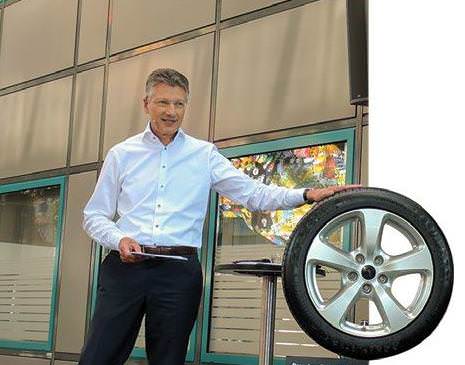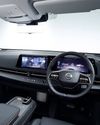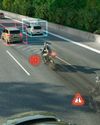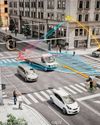試す 金 - 無料
Towards A Future That Is Clean, Safe, Affordable & Intelligent
Auto Tech Review
|July 2017
One of the world’s foremost mobility pioneers, Continental is at the forefront of developing technology solutions that promise not just to address, but change the course of mobility in the near to distant future. The Hanover headquartered Continental believes strongly that it has distinct competitive edge in the areas of electrification, connected mobility and automated driving – three areas that were on focus at the 2017 TechShow – and that it can make heavyweight contribution to the future of mobility – a future that is cleaner, safer, more intelligent and also affordable. Auto Tech Review brings you this ground report from Hanover, Germany.

For 146 years, Continental has been at the core of developing innovative products and services for the automotive and mobility industries. The global automotive sector has been evolving at an unprecedented pace in recent times, and Continental is in the thick of things as far as development and innovation of future mobility concepts, products and solutions are concerned.
Every two years, at the International Motor Show (IAA) in Frankfurt, Continental showcases its newest innovations. And prior to the Frankfurt show, the company invites automotive journalists from around the world to see and experience these innovations first-hand. This year, about 140 media professionals from Europe, North America, Asia and Australia gathered at the Contidrom Proving Grounds, located north of Hanover in the Lüneburg Heath for TechShow 2017.
In line with the global megatrends, Continental focussed on innovations in the three major areas of electrification, connectivity and automated driving. On offer were 12 development vehicles, and over 30 technologies. More on these later.

FUTURE MOBILITY
In the context of three innovation streams mentioned above, Dr Elmar Degenhart, CEO and Chairman of the Executive Board, Continental said while technology will continue to drive growth in the future, success would come only when technology becomes available, reliable and affordable. Looking ahead, he said the vehicle of the future will be somewhat electrified in the near future, fully electrified in the distant future, will be able to drive automatically and will be fully interconnected.
このストーリーは、Auto Tech Review の July 2017 版からのものです。
Magzter GOLD を購読すると、厳選された何千ものプレミアム記事や、10,000 以上の雑誌や新聞にアクセスできます。
すでに購読者ですか? サインイン
Auto Tech Review からのその他のストーリー

Auto Tech Review
Sound Generation For Enhanced Road Safety
With an ever-increasing number of fully electric and hybrid vehicles entering the market, we are witnessing a change in the acoustic experience in and around the car. The silent nature of the electric powertrain means that other road users miss the familiar acoustic cues that warn them of an approaching vehicle. To remedy this situation, Harman is working on various noise management solutions.
6 mins
August 2020

Auto Tech Review
OBJECTIVE ASSESSMENT OF THE SAFETY CONTRIBUTION OF TODAY'S AUTOMOTIVE HEADLAMPS
Good lighting makes a major contribution to road safety. In 2011, the International Commission on Illumination (CIE) presented an evaluation system for headlamps that can objectively assess the quality of illumination and glare limitation. New light sources like LEDs and lighting functions (glare-free high beam, partial high beam) have been available for several years, so that an extension of the proven CIE method is necessary, which takes into account, among other things, changed switch-on and service lives of new lighting functions and represents a generally understandable evaluation system. An evaluation system presented in the following by the Technische Uni versität Darmstadt, which was developed by an encompassing expert commission, is intended to provide representative data and enable an objective evaluation of headlamp performance.
8 mins
August 2020

Auto Tech Review
RAPIDO RE-INNOVATES TO CATER TO POST COVID-19 LAST MILE CONNECTIVITY
The rapid pace of urbanisation in the country has witnessed cities expanding and subsuming surrounding villages and smaller towns, evolving into Tier II and III cities.
5 mins
August 2020

Auto Tech Review
FUNCTIONAL SAFETY STANDARDS TOP PRIORITY FOR FUTURE AUTOMOTIVE DEPLOYMENT
Increasing levels of electronic content in vehicles result in a large amount of software that is required to run the scenes behind the mechanical aspects of a vehicle. Electronic systems in automobiles are part of every section, from the powertrain to comfort and convenience systems as well as all types of safety equipment. This makes electronics and the software running these systems a critical part of the equation for future mobility solutions. In addition, putting standards in place to measure methods of developing, testing and functioning of such electronic systems also becomes highly relevant.
5 mins
August 2020

Auto Tech Review
“BYD'S EV STRATEGY TO ENCOMPASS MOST FORMS OF TRANSPORTATION NEEDS IN INDIA”
The country’s electric vehicle (EV) ecosystem is grappling with a plethora of challenges even as it is striving to wriggle itself out of the ‘nascent stage’ tag. In an exclusive chat with Auto Tech Review, Zhang Jie Ketsu, Executive Director, BYD India shares his perspective on the current EV scenario and how the company intends to progress faster in the Indian automotive industry
7 mins
August 2020

Auto Tech Review
SAFETY IN ELECTRIC AND AUTONOMOUS CARS – SIMULATION OF COMPLEX CRASH SCENARIOS
Electric and autonomous vehicles allow for novel seating arrangements and packaging strategies, presenting new safety challenges. Physical crash testing must be supplemented with virtual simulation to ensure vehicle safety on shorter development cycles. With its Simcenter Madymo MBS software, Siemens provides improved runtimes and the Active Human model, enabling accurate and rapid occupant safety analysis in complex crash scenarios.
6 mins
August 2020

Auto Tech Review
KIA SONET – A MIGHTY OFFERING IN THE COMPACT SUV SEGMENT
It wouldn't be wrong to say that Kia Motors India has taken the Indian market by storm in less than 12 months of its presence in the market.
4 mins
August 2020

Auto Tech Review
NISSAN'S NEW DIRECTION: ARIYA ALL-ELECTRIC
Marking a key milestone in Nissan’s transformation strategy, Ariya ticks a lot of boxes highlighting the strengths of the global automotive giant.
5 mins
August 2020

Auto Tech Review
BETTER SAFETY WITH EMERGENCY BRAKE ASSIST FOR MOTORCYCLES
Rear-end collisions with a slower vehicle suddenly cutting into the lane and intersection accidents with cross-traffic are among the most frequent motorcycle accident types. Continental is now developing an emergency brake assist, which detects an imminent collision with a vehicle ahead or with an obstacle, warns the rider and supports him during braking
7 mins
August 2020

Auto Tech Review
ADAS WILL SERVE AS CATALYST FOR IMPROVED VEHICLE SAFETY
The automotive industry across the globe is increasingly focussing on safety.
5 mins
August 2020
Translate
Change font size
